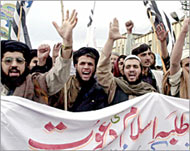Pakistan inquiry may embroil army
The Pakistani military’s role in proliferation of nuclear secrets could come under the scanner if attempts are made to prosecute disgraced top scientist Abd al-Qadir Khan, say analysts.

Khan, the father of Pakistan’s nuclear programme, confessed in an 11-page statement to selling nuclear expertise to Iran, Libya and North Korea from 1988 to at least 1997, the government has said.
The government is toying with the idea of prosecuting Khan, one of Pakistan’s most revered national heroes.
He has already been sacked as special adviser to the government on strategic affairs.
However, analysts have warned that trying Khan would open a “Pandora’s box”.
“Pushed to the wall, AQ Khan can spill the beans, which can complicate matters – especially Islamabad’s claims that technology leakage was done without official sanction,” Riffat Husayn, head of the Strategic Studies Department at Islamabad’s Quaid-e-Azam University, said.
To add to the government’s discomfiture, the News daily reported on Monday that Khan’s daughter left Pakistan last month carrying a cassette recording of Khan “in which he defends himself and levels charges against certain people”.
The paper said officials were trying to retrieve the tape “fearing it might damage the country if it fell into the hands of the anti-Pakistan lobby”.
Army brass accused
 |
|
The charges against Khan have |
In his statement, Khan accused former army chiefs Aslam Beg and Jehangir Karamat of “indirectly instructing” him to proliferate, a senior military official said.
“He named two gentlemen, (retired) generals Beg and Karamat, who were then questioned,” the official said.
Beg, who has denied approving or being aware of nuclear secrets being sold off, was army chief from 1988 to 1991, a post later held by Karamat from 1997 until 1998.
“(Khan) said they were in the know. In one case he said he did it on their instructions, but not directly. They asked someone else and that fellow instructed AQ Khan and that man is now dead.”
The middleman was the late brigadier Imtiaz Ali, defence adviser to Benazir Bhutto during her first tenure as prime minister from 1988 to 1990.
“There was no evidence found of what AQ Khan was saying, so it could not be sustained,” the official said.
But Beg and Karamat were questioned thoroughly, he added.
Military unconcerned
“If there is any more evidence of involvement of anyone else they will be questioned, no one is above the law,” the official said.
Pakistan’s military was “not at all” concerned about possible scrutiny if Khan was put on trial, he added.
“The military is keen to put the house in order, if at all someone is involved he must be taken to task and the house must be put in order.”
Officials also insist that no proliferation occurred after 2000, when the military established the National Command Authority (NCA) and command and control structures to secure the country’s nuclear programme.
“Certainly nothing happened after the NCA was established in 2000,” a government official said on Monday.